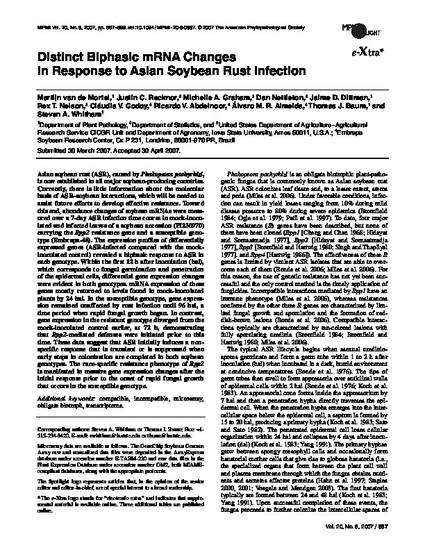
Asian soybean rust (ASR), caused by Phakopsora pachyrhizi, is now established in all major soybean-producing countries. Currently, there is little information about the molecular basis of ASR–soybean interactions, which will be needed to assist future efforts to develop effective resistance. Toward this end, abundance changes of soybean mRNAs were measured over a 7-day ASR infection time course in mock-inoculated and infected leaves of a soybean accession (PI230970) carrying the Rpp2 resistance gene and a susceptible genotype (Embrapa-48). The expression profiles of differentially expressed genes (ASR-infected compared with the mock-inoculated control) revealed a biphasic response to ASR in each genotype. Within the first 12 h after inoculation (hai), which corresponds to fungal germination and penetration of the epidermal cells, differential gene expression changes were evident in both genotypes. mRNA expression of these genes mostly returned to levels found in mock-inoculated plants by 24 hai. In the susceptible genotype, gene expression remained unaffected by rust infection until 96 hai, a time period when rapid fungal growth began. In contrast, gene expression in the resistant genotype diverged from the mock-inoculated control earlier, at 72 h, demonstrating that Rpp2-mediated defenses were initiated prior to this time. These data suggest that ASR initially induces a non-specific response that is transient or is suppressed when early steps in colonization are completed in both soybean genotypes. The race-specific resistance phenotype of Rpp2 is manifested in massive gene expression changes after the initial response prior to the onset of rapid fungal growth that occurs in the susceptible genotype.
Available at: http://works.bepress.com/thomas-baum/5/

This article is from Molecular Plant-Microbe Interactions 20 (2007): 887, doi:10.1094/MPMI-20-8-0887. Posted with permission.